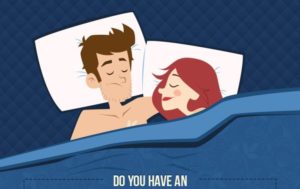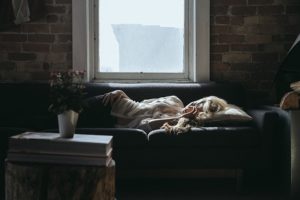Sleep…
Balm of hurt minds, great nature’s second course,
Chief nourisher in life’s feast.
William Shakespeare, Macbeth
I agree with the bard of Avon that a good night´s sleep is one of the essential elements that can guarantee a positive start for your day. Many people sleep poorly throughout their lives, without even realizing why this is
happening. They tend to think that it´s just a natural characteristic of their body and mind. In fact, the very common sleep apnea can go undiagnosed for many years, with very negative effects for the people who suffer from it.
If you are suffering from sleep apnea, putting into practice a lot of great tips to sleep well at night might help you a little, but it will not solve your problem.
In fact, many of the things that will give sleep apnea away happen while you´re asleep, which makes attempts at self-diagnosis a little more difficult.
SNORING
This is one of the things you will need to have other people observe for you while you sleep, if you suspect you may have sleep apnea.
The observer has to look for the following signs:
- Loud snoring, loudest when sleeping on your back
- Tossing and turning
- Pauses in breathing or snoring followed by gasping and struggling for air
CONSEQUENCES DURING THE DAYTIME
As a result of the poor quality of sleep, people suffering from sleep apnea may experience, on a daily basis:
- Fatigue, drowsiness; feeling almost as if you had slept very little/not slept at all.
- Headaches in the morning
- Cognitive impairment, lack of focus
- Chest pain, swelling in the legs, and heartburn.
- Nocturia; an urge to urinate during the night.
- Irritability
MEDICAL HISTORY
- Angina
- Infarct
- Hypertension
- Stroke.
OTHER RISK FACTORS
While virtually anyone may develop sleep apnea, there are many important risk factors that will greatly increase or decrease your chances of being affected.
- Obesity is responsible for roughly 70% of cases of sleep apnea.
- Males develop it twice as often as females.
- Having a close relative with sleep apnea increases your chances of developing it yourself
- Acid reflux problems can affect the vocal chords, causing apnea.
- Sinus problems, large tonsils and other similar physical characteristics can also result in apnea.
HOW IS SLEEP APNEA OFFICIALLY DIAGNOSED
If you recognize several symptoms and risk factors on these lists, you may be suffering from sleep apnea.
The most common type is called obstructive sleep apnea. The severity of this condition is measured in terms of how many air obstructions take place over a certain amount of time, while you are sleeping.
Testing commonly used for diagnosis include Electroencephalography to identify sleep stages and states, the measurement of arm and leg movements, detection of cardiac dysrhythmias and an inspection of the inside of the throat with a micro-camera.
A person with no sleep disorders will have up to 5 episodes of obstruction per hour, while someone suffering from severe apnea may experience over 30.
LIFESTYLE CHANGES AND NATURAL TREATMENTS
Although the most common and effective treatment for sleep apnea is the use of a breathing device, i.e. a mask you have to use for sleeping, which guarantees sufficient oxygen delivery, weight loss and a generally healthier lifestyle can have a much more long-term effect for those suffering from this condition.
Changing your sleep position will also greatly contribute to solve the problem, and so will quitting smoking and reducing alcohol consumption, especially at night.
Research has also shown that practicing wind instruments like the didgeridoo and exercises derived from speech therapy can also have a positive effect on apnea.
Original post image can be found at Epsos.de´s Flicker




I’ve been a sleep apnea sufferer for a number of years now and I will look at practically everything to assist me in my CPAP treatment. Thanks much.